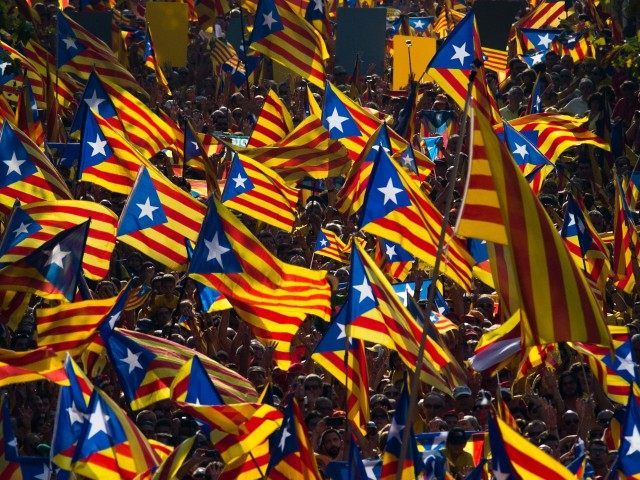BARCELONA, Spain (AP) — Catalan secessionists pushed for years for an independence referendum that Spain’s central government refused to allow. Now secessionists hope that Sunday’s regional parliament elections will put Catalonia on the road toward breaking away.
Polls show pro-secession parties in a slim lead to win the 68 seats they need for a majority in the 135-member Parliament, but independence for Catalonia is far from assured with a win.
Prime Minister Mariano Rajoy has repeatedly said that Spain’s constitution prevents autonomous regions that function like U.S. states from declaring independence. Analysts believe a win for secessionists could trigger negotiations to grant Catalonia more fiscal powers next year, reducing independence sentiment.
Here’s a look at how the independence drive developed and what’s at stake in Sunday’s election:
___
THE PUSH FOR SECESSION:
Catalans take pride in their language spoken along with Spanish in the region of 7.5 million people bordering France. The language was harshly suppressed during the 1939-1975 dictatorship of Francisco Franco.
The surge in independence sentiment stems from June 2010, when Spain’s Constitutional Court struck down key parts of a groundbreaking charter that would have granted Catalonia more autonomy and recognized it as a nation within Spain.
Spain’s financial crisis and resulting harsh austerity measures generated more support for independence. Artur Mas, Catalonia’s regional leader, began openly pushing for an independence referendum after he failed to clinch a better financial pact from for Catalonia from Madrid in 2012.
___
REFERENDUM REFUSED:
With polls showing Catalans overwhelmingly supporting the right to hold an independence referendum, Mas in 2014 announced a non-binding referendum to gauge secession sentiment — but was forced to call it off and instead stage an unofficial poll.
The country’s Constitutional Court agreed with the central government that the referendum would have violated Spain’s constitution which says only the national government can call referendums on sovereignty and that all Spaniards must be allowed to vote. Spain’s constitution also does not contemplate the possibility of a region breaking away.
About 2.3 million Catalans — out of 5.4 million eligible — ended up voting in the non-binding poll on Nov. 10, with 80 percent in favor of breaking away from Spain.
Rajoy called the vote a failure and ruled out talks for a legal independence ballot.
___
A COMPLICATED VOTE
Mas then decided in coordination with pro-independence groups that the election for regional lawmakers would serve as a substitute independence vote.
Polls show the race is tight and that the large “Together for Yes” block formed by pro-independence parties will need support from the small, radical Popular Unity Candidacy (CUP) to have a majority of parliamentary seats. Without the majority, secessionists concede, their cause will be set back for years.
Polls suggest secessionists are on track to get less than half of the overall votes, which would hurt the legitimacy of a possible “Yes” outcome.
CUP leaders have said they will not join an independence alliance if a majority of secessionist lawmakers are elected with less than half of the overall vote. And the CUP wants an immediate independence declaration in the event of a majority popular vote for secession, plus the ouster of Mas over his administration’s imposition of austerity measures.
Another complication: Spanish voting rules give more weight to votes cast in under-populated regions. Separatist sentiment runs higher in rural Catalan regions than it does in urban areas including the regional capital of Barcelona, Spain’s second-largest city.
___
INDEPENDENCE ROADMAP
The “Yes” camp hopes within days after the vote to announce an 18-month secession roadmap to make Catalonia a new nation by 2017. But their independence path hasn’t been outlined with specifics and it’s unclear how detailed it would be.
So far, secessionist leaders have said that a majority of pro-independence lawmakers would give Mas or whoever leads Catalonia the power to call the parliament a “transition government.”
It would start drafting laws for Catalonia and a constitution while attempting to negotiate independence with the central government and trying to drum up international support.
Secessionists have left open the possibility that the regional lawmakers could issue a unilateral declaration of independence.
___
MADRID’S RESPONSE
Rajoy and others in his administration have made it clear that they will use all legal methods to prevent the independence of Catalonia, which accounts for nearly a fifth of Spain’s economic output.
But many analysts believe the independence drive will be halted after Spain holds general elections in December and decides whether Rajoy and his Popular Party stay in power or not.
Whoever wins, analysts say, the next government is likely to start negotiating more autonomy and fiscal powers for Catalonia.
“Even if secessionist parties are able to remain united — a big if — and continue pushing for independence, any concessions from Madrid would probably help to stymie the movement’s momentum,” said Antonio Barroso, a London-based analyst with the Teneo Intelligence political risk consultancy.

COMMENTS
Please let us know if you're having issues with commenting.